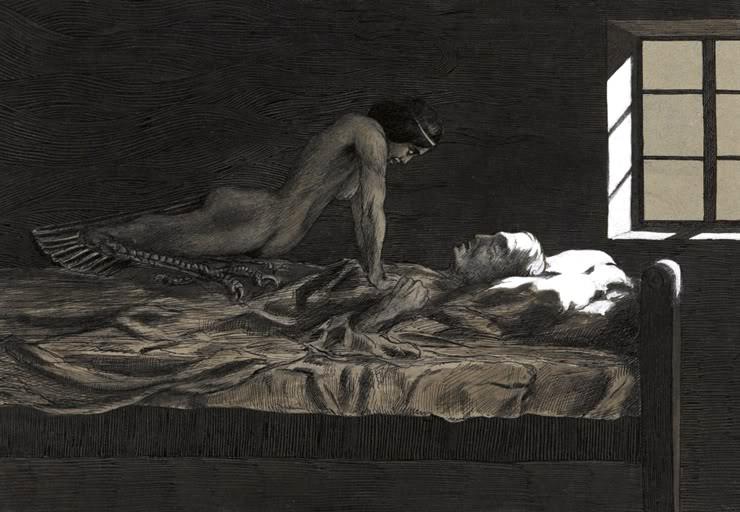This post is also available in Dutch.
Have you ever experienced sleep paralysis? You’re in bed, you’re asleep, and yet you can sense the presence of someone in your room. What causes this hallucination and what can you do about it?

Picture Fritz Schwimbeck – My Dream, My Bad Dream. 1915
I know that I am in my bed, in my room. I am aware that I am asleep. I can’t see anything but I can sense the presence of somebody or something, and I feel a weight on my chest. I want to wake up immediately but I can’t move or make a sound. When I am finally able to open my eyes I see somebody disappearing behind my bed.
Sleep paralysis
This experience is called sleep paralysis and it is a common symptom of a sleeping disorder called narcolepsy. People who suffer from narcolepsy have a disturbed sleep-wake cycle. Some of the features of sleep paralysis include sensing a presence of somebody or something in the room, feeling pressure on the chest, sensations of floating, hearing sounds or an out-of-body experience.
In some cases, healthy people can also experience sleep paralysis. For instance, sleep deprivation, unpredictable sleep patterns, or stress can trigger sleep paralysis. This means that shift workers are at a higher risk to experience sleep paralysis than non shift workers.
Don’t wake up the “dreaming brain”!
Sleep paralysis happens during REM sleep, the dream phase of the sleep. During REM sleep the voluntary movement of your muscles is impossible. The brain itself is very active but the muscles are paralysed. This paralysis has a clear function: to prevent you from acting out your dreams! On the occasion that you wake up before the end of the REM sleep phase or if REM sleep starts before you fall asleep, you may likely experience sleep paralysis. In this case, your brain is “dreaming”, your muscles are paralysed, and you have entered a unique state of consciousness: being aware while sleeping.
Induced sleep paralysis
Scientists have been able to induce sleep paralysis in healthy test subjects. In one study, participants were woken up at a particular period during their sleep in order to disrupt the REM phase. As a consequence, participants entered the so-called sudden-onset REM sleep, they entered REM sleep skipping other sleep phases, which increased the chance of experiencing sleep paralysis. This study supported the theory that sleep paralysis is related to a disturbed sleep-awake cycle.
Wake me up
Sleep paralysis can be a frightening and very unpleasant experience. Some people might enjoy this unusual state of consciousness, but most people probably want to wake up from it immediately. Unfortunately it is not possible to shorten episodes of sleep paralysis – you can only wait for it to pass, which usually takes no longer than a minute. Nevertheless, once someone understands why he or she is suffering from sleep paralysis, this might help to deal with the anxiety that accompanies it. In addition, maintaining a regular sleep pattern may decrease the chance of reoccurring events of sleep paralysis.
This blog is written by Kasia
Edited by Jeroen

Interesting! Thanks